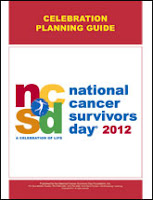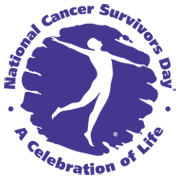The 25th
annual National Cancer Survivors Day is Sunday, June 3, 2012.
"National Cancer Survivors Day® is an annual, treasured worldwide Celebration of Life that is held in hundreds of communities throughout the United States, Canada, and other participating countries. Participants unite in a symbolic event to show the world that life after a cancer diagnosis can be meaningful and productive..."
Well who knew? I sure didn't!
Every time I read something about cancer "survival" or being a cancer "survivor"... I still just can't fully "connect" to the statement or idea.
Have I never really fully processed that I was diagnosed and treated for a terminal blood CANCER?
Have I "forgotten" all my TRAUMATIC live-saving treatments? Hardly!!!
Am I in denial?
Seriously, I should be fully "in touch" with all of this! But honestly... I feel a disconnect...
Yet-
I do know I was shocked when I was actually diagnosed on December 30, 2009
I do know I was really affected by all my initial chemo treatment medications early 2010
I do know I suffered from IV Cytoxan chemo June 2010
I do know I suffered from IV Melphalan chemo July 2010
I do know I received my own stem cells back in an Autologus Stem Cell Transplant July 5, 2010
I do know I was very seriously ill and could have died... several times... had I not had the treatments I did
I do know I lost my hair and had a complete visual make over, several times over since
And I do know I have continued on monthly maintenance Revlimid chemo to this day to continue to battle back the Myeloma cells trying to invade and make a come-back
AND I KNOW I AM VERY FORTUNATE TO STILL BE IN REMISSION!!! and approaching my 2 year SCT anniversary!
So to celebrate Cancer Survivor's Day TODAY and my personal remission since late summer 2010 and other's battling CANCER along with me-
I am wearing a Tshirt that says in BOLD letters: SURVIVOR
Ok... I am trying to feel this, trying to connect, trying to process I had/have cancer...
Here's the pictorial of me celebrating Remission at various Cancer events this year:
RELAY FOR LIFE May 2012
with my dear friend and avid supporter
Kelly
S U R V I V O R S! May 2012
Hubby Jim and me
Wow, how can we both be Cancer Survivors?
(not to mention that son of ours
who is further out of touch with this cancer thing than me!)
Next BIG Survivors event:
City of Hope's giant BMT - SCT reunion
extravaganza with thousands of survivors!
And I mean THOUSANDS!!!
Seriously amazing!!!
Find me and Jim... left corner (I'm in red) 3rd row behind "Welcome"
Me, my awesome Dr Kogut and fellow Myeloma survivor Jim
Me and Dr Kogut
Mr Awesome himself
Me, being me, showing off my 22 months
Post Stem Cell Transplant button
Ok, so after all I've been through 2009, 2010, 2011, 2012
you'd think I would connect with having cancer, right?
Well I do...
when I try to do things like I did
prior to a terminal cancer diagnosis
that's when I connect with
C A N C E R
as cancer stole my "perfect" health
my energy
my stamina
my get up and go
and my ability to be Cowgirl Julie
So my new hobby is
short distance
Horse Back Walking :)
HAPPY CANCER SURVIVOR's DAY 2012







.jpg)

